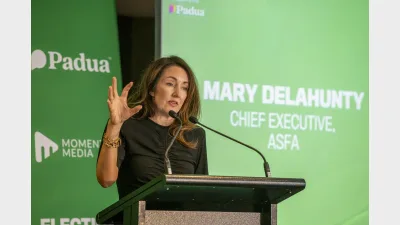Facing up to FOFA's challenges


 The Government’s release of its Future of Financial Advice proposals have signalled key changes with respect to financial advice and, as Damon Taylor reports, many superannuation funds are making sure they are geared to meet the challenge.
The Government’s release of its Future of Financial Advice proposals have signalled key changes with respect to financial advice and, as Damon Taylor reports, many superannuation funds are making sure they are geared to meet the challenge.
Having granted significantly easier access to financial advice for a much larger percentage of Australians, intra-fund advice has been a key milestone for the superannuation industry.
Through call centres, online calculators, even face-to-face limited advice, funds have risen to the occasion when it comes to the products they have brought to the table to benefit members and according to AustralianSuper general manager for growth and new opportunities, Paul Schroder , the momentum is only set to increase.
“Simply put, we feel that intra-fund advice is a fundamental part of the full spectrum of advice,” he said.
“It makes sense because when people ring up, they just want help; they want simple help about investment choice or levels of insurance adequacy and very often they actually want help about things that aren’t necessarily particularly superannuation-related.
“They might just want reassurance; they might see markets turning and wonder what it means for their house. They hear a rumour and they just want someone to dispel that rumour; sometimes it’s just about legislation, sometimes it’s about broader market questions,” continued Schroder.
“It could be any of those things and intra-fund advice can give them those answers and, more importantly, it can do so quickly and easily.”
Meeting a need
Providing a point of reference as to what intra-fund advice services were currently available to super fund members, Club Plus Super chief executive Paul Cahill said that his fund’s advice offering was continually evolving to meet member demand.
“We actually have three levels of advice that we offer members and it extends beyond intra-fund,” he said.
“We have the general advice space, which is really your 1800-number where people will ring in and ask for the very low-grade stuff and we have our own dedicated call centre for that.
“In the middle space is our intra-fund licence and that really relates to our member service managers who are mainly out in the field talking to members, employers and the like,” Cahill continued.
“But we do limit them on what they can talk about so that we have it segmented.”
Cahill said that the last piece of the puzzle and one which had only started on 1 October, 2010 had been Club Plus Financial Planning.
“So what we try to do is direct people or members into each of those channels,” he said.
“If someone needs a low-grade bit of advice, it’s straight in on the 1800-number; if they need some intra-fund advice, which is the middle of the range stuff — like investment options, insurance help, rollover, that sort of thing — the member service managers do that under the intra-fund licence that the super fund currently has.
“Then finally, for all the transitions to retirement, pensions, full financial planning, all of that goes into the Club Plus Financial Planning channel and that’s really been the icing on the cake for our intra-fund advice services.”
Outlining her own fund’s interpretation of intra-fund advice, AvSuper chief executive Michelle Griffiths made it clear that it had primarily been about filling advice gaps.
“We actually had, and still have, an existing relationship with Outlook Financial Solutions for full financial planning but when we first started looking at intra-fund, we started with what we called a ‘member advice solution’,” she said.
“We had a member advice manager and we started on that basis so that individuals could call us and we could provide that advice, either over the phone or in person where we were able to arrange face-to-face meetings.
“That was the immediate first launch but we supplemented that with an online calculator which is available on our public website,” Griffiths added.
“We obviously have some plans for further expansion with the extended topics that will become available from July, so at that point we’ll take stock again and see what the member demand is.”
Producing results
Yet the results thus far, according to Griffiths, had been outstanding.
“We’ve had terrific take-up through each of those stages of the program so far and while I’d prefer not to disclose the actual numbers, I will say that in the four months since we launched we’ve done an equivalent number of SOAs [Statements of Advice] on an intra-fund basis to what was the annual take-up rate of our external adviser group over the preceding 12 months,” she said.
“So there’s clearly an appetite on the part of our members for quite specific advice that perhaps wasn’t being captured through a full advice model.
“Those who want fuller advice about their wider financial situation are still able to do so, but based on our experience thus far, there is clearly a demand for both.”
So while intra-fund advice may yet be in its infancy, it is apparent that funds and their executives have thought hard about how best to suit it to their membership. But that is not to say that intra-fund advice is without its critics.
An issue receiving a lot of debate at the moment is whether super funds’ access to intra-fund advice is actually a threat to the services offered by financial planners themselves but for Schroder, it is a response he simply cannot understand.
“If you’re asking me whether intra-fund advice impinges upon full-service financial planning, my answer is — categorically — no,” he said.
“People will engage in different ways and at different levels at different times, so intra-fund advice isn’t an alternative to face-to-face advice, it’s a part of the spectrum of advice that people will seek to access.
“As they come to want to deal with more complex matters and to go more deeply into it, then they’ll go to see someone face-to-face and we’ll want them to see someone face-to-face who’s going to have their interests first, who’s not going to be seeking a conflicted trail commission or a volume-based bonus,” Schroder continued.
“They’ll go and see someone who will charge them what it costs to provide the advice, and that advice will be in their interests.”
Echoing Schroder in many respects, Cahill said that the advice going through his fund’s financial planning channel was completely different to that going through the intra-fund advice channel.
“Financial planners, by and large, are doing the high-end stuff, doing a lot of the lumpy, heavy-duty planning-type issues and in our planning business, that’s where all of that stuff ends up,” he said.
“Where you get the middle of the road stuff — what investment option should I be in, do I have enough insurance, am I putting enough money into super? — intra-fund is perfect for that.
“I suspect that many financial planners would have the old 80/20 rule,” Cahill continued. “So 80 per cent of their business would be on the high-end — clunky, high-value stuff and 20 per cent on the low-grade stuff.
“So to say that they would be put out of business by intra-fund, I find a bit odd.”
Of course, the issue here for financial planners may come down to which members are actually accessing intra-fund advice. If intra-fund clients are, in fact, previous full-service financial planning clients, then a loss of business is implied.
Yet, in saying that a number of AvSuper members had been in exactly these circumstances, Griffiths said that while she could appreciate the issue, it was not one she would validate.
“I did query this situation with our financial planning provider in Outlook Financial Solutions because I was obviously aware that there was potential for our arrangements to impact on the arrangements that they already had in place with members,” she said.
“But they didn’t feel that there was going to be a great impact at any material level because they simply weren’t dealing with those queries to date.
“I think there’s perhaps a question here around the trusted adviser, where some of these members may or may not have felt comfortable discussing these issues with an external adviser with whom they didn’t have a relationship,” Griffiths added.
“But they clearly did have some comfort in discussing those with us.
“Based on our early research, we certainly weren’t expecting the outstanding member demand that we’ve received, but it’s here now and there’s no reason why the two services can’t be complementary.”
Alternatively, Cahill said that 10 years of Club Plus Super research had actually shown that a crossover between those members accessing intra-fund advice and those seeking a full-service financial plan was exceedingly rare.
“There’s a bunch of people who are predisposed to getting financial plans in Australia and that’s about 30 per cent of the Australian marketplace demographic by size,” he said.
“They seek financial planning; they buy it and see value in it as a service but the vast bulk of Australians don’t.
“So we know now that there are people out there who probably never would have got advice and would have just sort of stumbled along the road,” continued Cahill.
“But what we can do is see them and work with them to try to get as much information to them from either the intra-fund space or, if we can get them into the financial planning space, and it’s appropriate, we work hard to get them there too.
“But this isn’t because we’re trying to make a dollar out of it — we do it for their benefit because, at the end of the day, we want to make sure they maximise their retirement income by getting the correct advice.”
Putting it all together
On the back of an AustralianSuper announcement of trial arrangements between the industry fund and several financial planning dealer groups, Schroder reiterated his belief that intra-fund advice and full-service financial planning were both individual but integral pieces in the advice puzzle.
“I reckon this is a phony war being crafted by the opponents of the FOFA (Future of Financial Advice) reforms,” he said.
“It seems utterly logical to me that people at different times of their lives will want to get advice at different levels to suit what they need at that time.
“If a member finds that intra-fund advice suits his or her needs better than a full-service financial plan, what is wrong with that?” asked Schroder.
“If a member finds they get great advice and they’re really happy with an online calculator and it answers their question — terrific!
“We shouldn’t be asking them to do more, we shouldn’t be charging them for more and we shouldn’t be forcing them through a process — what we should be thinking about is what does the member want and what’s in that member’s best interest, not what’s in the commercial or revenue interests of one or other provider in this sector.”
Looking to the future and to whether the super industry was heading down a path where its members’ financial advice needs would be increasingly better satisfied, Griffiths said there was no reason why there couldn’t be agreement between the planner and super sides of advice.
“I would certainly like to believe that there’s an opportunity for both services to be complementary in terms of their ability to meet individuals’ needs both as a superannuation fund member as well as a member of the general community,” she said.
“Personally, I don’t see that the two should necessarily be at odds with each other and, prospectively, we’re well on our way to making sure that that’s the case.
“I don’t think either piece of advice would necessarily serve any purpose if it was in isolation from the other; both need to be working together,” Griffiths continued.
“So I don’t know that we’re necessarily there yet and obviously, with impending reforms and the impact they will have for everyone, it’s going to be a very difficult negotiation process.
“But I’m not sure that any of that matters to our members. They just want financial advice that meets their needs and is in their best interests and I’m not sure that they would necessarily see a distinction between one type of advice, or advice provider, and another.”
Schroder advised that moving forward was as simple as putting members first.
“We will all have entirely aligned views and we’ll all be in the same boat, paddling in the same direction if we put ourselves in the shoes of the members and keep top of mind what is in their best interests.”
Recommended for you
Aware Super has made a $1.6 billion investment in a 99-hectare industrial precinct in Melbourne’s North which, the fund clarified, also houses the nation’s first privately funded open-access intermodal freight terminal.
ASFA has affirmed its commitment to safeguarding Australia’s retirement savings as cyber activity becomes an increasing challenge for the financial services sector.
The shadow treasurer is not happy with the performance of some within the super sector, telling an event in Sydney on Thursday that some funds are obsessed with funds under management, above all else.
As the Australian financial landscape faces increasing scrutiny from regulators, superannuation fund leaders are doubling down on their support for private markets, arguing these investments are not just necessary but critical for long-term financial stability.













